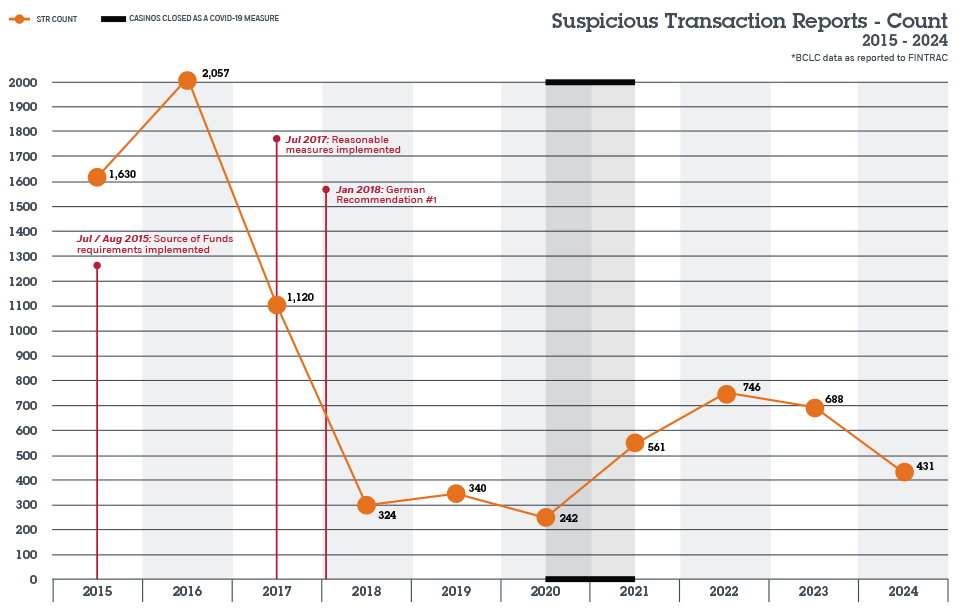Safeguarding Against Financial Crime in B.C. Casinos
Working with our partners in the system, including police, regulators, industry partners and government, BCLC continues to evolve programs to safeguard B.C. casinos from financial crime. This includes addressing and investing in recommendations to improve resources to track and enhance controls which helps to keep B.C. casinos and communities safe.
Since 2012, BCLC has put processes in place which have resulted in a dramatic decline in suspicious transactions in B.C. casinos.
What is money laundering?
Money laundering is the process of concealing the origin of money obtained from criminal activity and converting it to appear as if it was acquired through legal means. Money laundering is a crime that affects multiple sectors of the economy.
In 2012, BCLC changed its policy to enable B.C. casinos to offer Patron Gaming Fund (PGF) accounts. A PGF account is for gaming use specifically and exists to facilitate gaming play, not to provide financial services typically offered through personal bank accounts. With PGF accounts, players no longer have to take large amounts of cash in and out of casinos; they are able to hold money in their PGF accounts to use while at the casino the account is held at.
This includes suspicious indicators like the exchange of small-denomination bills for large-denomination bills and the passing of casino chips between patrons. We also take steps to know our players, including using various intelligence tools and methods to confirm player information and their source of wealth.
The BCLC AML Unit uses a transaction monitoring and FINTRAC reporting system to track play and reportable transactions. Everi Compliance adheres to all current regulatory requirements and includes the ability to file Suspicious Transaction Reports (STRs), Casino Disbursement Reports (CDRs), Large Cash Transaction Reports (LCTRs), and complete Know Your Customer (KYC) procedures. Everi allows BCLC to minimize the money laundering risks associated with unknown play, decrease the overhead associated with the identification and tracking of players at the Service Provider level, increase the efficiency and effectiveness of the investigation and filing of STRs to FINTRAC, and maintain a more secure overall gaming environment.
BCLC employs internationally certified investigators and intelligence analysts for its anti-money laundering unit. BCLC also requires and supports all casino employees with anti-money laundering training to identify, report and help prevent money laundering.
BCLC bans individuals from casinos whose presence is undesirable. This includes individuals suspected of criminal activity, believed to be a public safety risk or members of organized crime groups. Since 2014, BCLC has barred nearly 1,000 individuals from B.C. casinos.
This BCLC policy prevents individuals from using large cash buy-ins, participating in minimal play and cashing out to receive generic casino cheques.
BCLC implemented this policy in 2018 in response to the German Report's recommendation, requiring casino operators to complete a Source of Funds Declaration for all cash and bank draft/certified cheque buy-ins of $10,000 or more.
Since 2015, BCLC has placed sourced-cash conditions on certain players: specified individuals cannot buy-in with any amount of cash unless they disclose their source of funds. Casino staff have the discretion to ask anyone to provide the source of their funds, regardless of the amount. Further to this, BCLC requires casinos to verify the identity of every player who reaches $3,000 or more in buy-in transactions or disbersements in a single day.
Before players can access their account, BCLC reviews the player’s government-issued photo ID and credit history. With verified accounts, BCLC can effectively oversee all transactions and players on PlayNow.com.
Suspicious Transaction Reports
BCLC sends suspicious transaction reports (STRs) to the Financial Transactions and Reports Analysis Centre of Canada (FINTRAC) based on reasonable grounds to suspect the transaction(s) are related to a money-laundering related offence, including proceeds of criminal activity and fraud. These reports are important in assisting FINTRAC with the detection, prevention and deterrence of money laundering.

While STRs can assist in the detection, prevention and deterrence of money laundering, an STR does not mean that a money-laundering offense has occurred.
Our continued commitment
In May 2019, the provincial government announced the Commission of Inquiry into Money Laundering in British Columbia to make findings of fact and recommendations regarding the issue of money-laundering across multiple sectors of B.C.'s economy. In June 2022, the Commission of Inquiry into Money Laundering in B.C. produced a final report of its findings.
Three of the Commissioner's 101 recommendations are directed at BCLC:
- that BCLC move to 100% account-based known play;
- that the threshold for requiring proof of the source of funds for casino transactions conducted in cash and other bearer monetary instruments be lowered to $3,000; and
- that current limits on the amounts that casinos can pay out to patrons in the form of convenience cheques remain in place.
Our response
BCLC operates with 100% verified, account-based play on its online channel, PlayNow.com, and is committed to increasing verified play in casinos through the Encore Rewards loyalty program. To achieve this, BCLC is developing strategies to engage players and support player acceptance of verified, account-based play, as well as investments in technology – including the implementation of Everi Compliance, BCLC's transaction monitoring and FINTRAC reporting system.
Casino service providers refuse any transaction that does not meet the strict source of fund requirements, as per BCLC Standards and anti-money laundering policies and procedures. As of June 2024, BCLC requires casinos to track play for all accumulated transactions of $1,500 or more, as well as verify the identity of every player who reaches $3,000 or more in buy-in transactions or disbursements in a single day. Limits on the amounts that casinos are able to pay out to patrons in the form of convenience cheques continue to be maintained.
BCLC continues to work with the provincial government to address these the three recommendations, to take action to improve AML programs in B.C. casinos and to invest substantial resources to monitor and enhance our AML controls.
